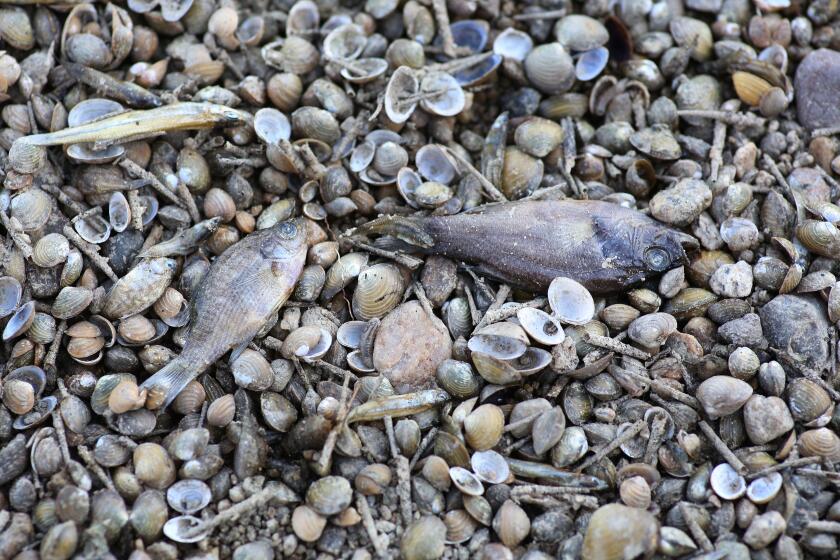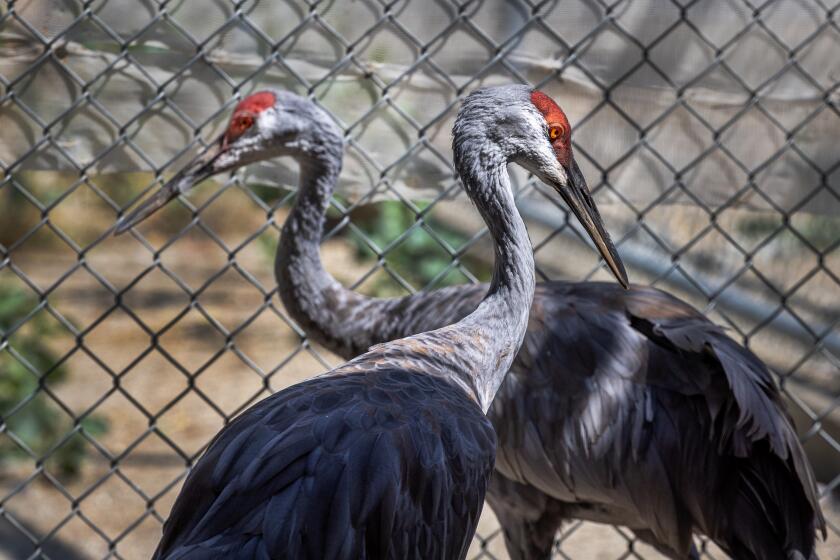Atlanta’s 2nd whale shark dies
Losing one whale shark may have seemed a misfortune. But when another of the rare fish at the Georgia Aquarium died Wednesday, there was talk of carelessness: It was, in short, a public relations crisis.
Norton, a 23-foot juvenile whale shark and one of the stars of Atlanta’s super-sized aquarium, was euthanized after he had slowly spiraled to the bottom of his tank.
His death -- five months after his tank-mate, Ralph, met a similar fate -- has reignited a debate about whether aquariums should exhibit whale sharks. Relatively little is known about the world’s biggest species of fish, which can grow as long as 60 feet.
Housed in the largest tank in the world, Norton had not eaten regularly for months and was being force-fed through a PVC pipe. Aquarium officials said he had shown occasional interest in food, and they had been hopeful he would improve; so hopeful that two weeks ago they imported two more whale sharks from Taiwan.
Ray Davis, the aquarium’s senior vice president of zoological operations, said all of the remaining whale sharks -- Alice, Trixie, Taroko and Yushan -- were eating well and had shown no symptoms of stress.
Norton’s death did not come as a shock to whale shark experts, who repeatedly had warned the aquarium against displaying the giant creatures.
“These animals, their lifecycle is very rich and complex,” said Jason Holmberg, a whale shark researcher for the Earthwatch Institute who noted that the species is known to plunge to depths of more than 3,000 feet and has a migratory pattern that covers thousands of miles. “All of a sudden,” he said, “they are stuck in a very small tank. It may be the greatest in the world, but it is tiny compared to their natural habitat.”
The loss of Norton brought an outpouring of grief from Georgia residents.
The Atlanta Journal-Constitution started an online guest book, which filled with tributes to Norton. The website’s blog filled even more quickly with recriminations for aquarium officials. One reader suggested changing the name of the aquarium to the “Georgia Whale Shark Execution Pool,” while others thought it might be better converted into a casino. More than a few said they would not visit the aquarium again.
The cause of Norton’s death is not yet known, aquarium officials said. A necropsy conducted on Ralph identified the cause as peritonitis, an inflammation of the membrane that lines the abdominal cavity.
Husbandry and veterinary teams at the aquarium are looking for links between the two deaths. One possibility is a series of pesticide treatments the aquarium used in 2006 to get rid of parasites.
The two fish, named after characters on the television show “The Honeymooners,” arrived in Atlanta in June 2005 to much fanfare.
While some scientists and animal rights organizations expressed concerns -- the fish previously had not been exhibited outside Asia -- the aquarium emphasized that Ralph and Norton had been bought from fishermen in Taiwan and would have ended up as someone’s dinner.
At the aquarium, they were celebrities: they roamed a 6.2-million-gallon tank and were served a carefully prepared diet of krill, plankton and tiny fish.
Bernard Marcus -- the billionaire and co-founder of Home Depot who invested $250 million in the aquarium -- made much of his hope that the facility would eventually become the first to breed whale sharks.
To that end, two females arrived at the aquarium in June 2006.
Two more males joined them earlier this month after tense negotiations with Taiwanese officials, who expressed concern following Ralph’s death. Taiwan has announced that starting next year, it will prohibit the capture, sale and export of whale sharks.
Despite unease over the future of the whale sharks still at the aquarium, Davis said, having them here provides invaluable scientific information.
“The naysayers say there’s not much to learn about these animals in an aquarium setting, but it is incredibly beneficial,” he said, noting that aquarium scientists soon will publish a study about the feeding mechanics of whale sharks. “Even in death, these whale sharks will provide information not available prior to this,” Davis said.
Naomi Rose, a marine mammal specialist at the Humane Society of the United States, remained unconvinced.
“This aquarium likes the whale shark as a novel animal that has pizazz,” she said. “It’s all marketing. I don’t know what they think they learned -- except that they used a chemical that they shouldn’t have used.”
--
More to Read
Sign up for Essential California
The most important California stories and recommendations in your inbox every morning.
You may occasionally receive promotional content from the Los Angeles Times.











